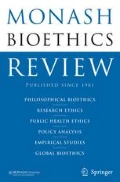Abstract
In this article, I will explore the ethical concerns arising out of the use of preimplantation tissue typing (PTT) to create saviour siblings. There are two main ethical concerns about the welfare of the child to be born as a result of PTT. The first is whether the child to be born is treated as a commodity, as simply a means to save the life of his or her sibling. The second is whether the child to be born will be harmed as a result of PTT, either physically, psychologically or socially. These two ethical concerns reflect an individualistic approach to the welfare of the child, whose interests are treated as largely separate to the interests of other family members. I will argue that the welfare of the child born as a result of PTT should be conceived more broadly to include not only the child’s individual interests, but also the collective interests the child shares with his or her family. I base this broader conception of welfare on the notion of human flourishing, which recognises that the welfare of a child is inextricably connected to the welfare of the intimate collective that is his or her family. The collective interests of intimate family members are particularly relevant in the context of PTT, as the members are engaged in a shared journey to save the life of an ill child.
Similar content being viewed by others
References
American Academy of Pediatrics. 2010. ‘Policy statement — Children as hematopoietic stem cell donors’. Pediatrics 125(2): 392–404.
Assisted Reproductive Treatment Act 2008 (Vic).
Bernstein, D. M; Simmons, R. G. 1974. ‘The adolescent kidney donor: The right to give’. American Journal of Psychiatry 131(12): 1338–43.
Blustein, Jeffrey. 1993. ‘The family in medical decision making’. Hastings Center Report 23(3): 6–13.
Boyle, Robert; Savulescu, Julian. 2001. ‘Ethics of using preimplantation genetic diagnosis to select a stem cell donor for an existing person’. British Medical Journal 323 (7323): 1240–43.
Cohen, Cynthia. 1996. ‘Give me children or I shall die!’ Hastings Center Report 26(2): 19–27.
Crouch, Robert; Elliott, Carl. 1999. ‘Moral agency and the family: The case of living related organ transplantation’. Cambridge Quarterly of Healthcare Ethics 8: 275–87.
Freund, B; Siegel, K. 1986. ‘Problems in transition following bone marrow transplantation: Psychosocial aspects’. American Journal of Orthopsychiatry 56 244–52.
Friedman, Marilyn. 1993. What Are Friends For?: Feminist Perspectives on Personal Relationships and Moral Theory. Ithaca, NY: Cornell University Press.
Gavaghan, Colin. 2007. Defending the Genetic Supermarket: Law and Ethics of Selecting the Next Generation. London: Routledge-Cavenish.
Grundell, Erica. 2003. ‘Tissue typing for bone marrow transplantation: An ethical examination of some arguments concerning harm to the child’. Monash Bioethics Review 22(4): 45–55.
Harris, John. 2000. The welfare of the child’. Health Care Analysis 8(1): 27–34.
Held, Virginia. 2006. The Ethics of Care: Personal, Political, and Global. Oxford; New York: Oxford University Press.
Human Genetics Commission. 2006. Making Babies: Reproductive Decisions and Genetic Technologies. London: Human Genetics Commission.
Human Tissue Act 1982 (Vic).
Jansen, Lynn. 2004. ‘Child organ donation, family autonomy, and intimate attachments’. Cambridge Quarterly of Healthcare Ethics 13(2):133–42.
Kant, Immanuel. 1998. Groundwork of the Metaphysics of Morals, tr. Mary J. Gregor, with an introduction by Christine Korsgaard. Cambridge, U.K.; New York: Cambridge University Press.
Kuczewski, Mark. 1996. ‘Reconceiving the family: The process of consent in medical decisionmaking’. The Hastings Center Report 26(2): 30–7.
Liao, S. 2006. ‘The right of children to be loved’. The Journal of Political Philosophy 14(4): 420–40.
MacLeod, Kendra. 2003. ‘Pediatric sibling donors of successful and unsuccessful hematopoietic stem cell transplants: A qualitative study of their psychosocial experience’. Journal of Pediatric Psychology 28(4): 223–30.
McNair, Ruth. 2004. Outcomes for children born of ART in a diverse range of families. Melbourne: Victorian Law Reform Commission.
National Health and Medical Research Council. 2007. Ethical guidelines on the use of assisted reproductive technology in clinical practice and research. Canberra: National Health and Medical Research Council.
Nelson, James. 1992. ‘Taking families seriously’. The Hastings Center Report 22(4): 6–12.
Nelson, Hilde Lindemann; Nelson, James Lindemann. 1995. The Patient in the Family: An Ethics of Medicine and Families. New York: Routledge.
Packman, W. 1999. ‘Psychosocial impact of pediatric BMT on siblings’. Bone Marrow Transplantation 24: 701–06.
Parfit, Derek. 1986. Reasons and Persons. Oxford: Clarendon Press.
Rachels, James. 1991. ‘When philosophers shoot from the hip’. Bioethics 5(1): 67–71.
Ruddick, Sara. 1989. Maternal Thinking: Toward a Politics of Peace. Boston: Beacon Press.
Savulescu, Julian 1996. ‘Substantial harm but substantial benefit’. British Medical Journal 312: 241.
Schoeman, Ferdinand. 1980. ‘Rights of children, rights of parents, and the moral basis of the family’. Ethics 91(1): 6–19.
Schoeman, Ferdinand. 1985. ‘Parental discretion and children’s rights: Background and implications for medical decision-making’. The Journal of Medicine and Philosophy 10(1): 45–62.
Sheldon, Sally; Wilkinson, Stephen. 2004. ‘Hashmi and Whitaker: An unjustifiable and misguided distinction?’ Medical Law Review 12(2): 137–63.
Sheldon, Sally; Wilkinson, Stephen. 2004. ‘Should selecting saviour siblings be banned?’ Journal of Medical Ethics 30(6): 533–37.
Sherman, Nancy 1993. ‘The virtues of common pursuit’. Philosophical and Phenomenological Research 53(2): 277–99.
Smith, Patricia. 1993. ‘Family responsibility and the nature of obligation’. In Kindred Matters: Rethinking the Philosophy of the Family, edited by Tietjens Meyers, Diana; Kipnis, Kenneth; Murphy, Cornelius F. Jr. Ithaca: Cornell University Press.
Thomas, Cordelia. 2004. ‘Pre-implantation testing and the protection of the “saviour sibling”’. Deakin Law Review 9(1): 119–143.
Transplantation and Anatomy Act 1978 (ACT).
Author information
Authors and Affiliations
Corresponding author
Rights and permissions
About this article
Cite this article
Taylor-Sands, M. Saviour Siblings And Collective Family Interests. Monash Bioethics Review 29, 1–15 (2010). https://doi.org/10.1007/BF03351522
Published:
Issue Date:
DOI: https://doi.org/10.1007/BF03351522


